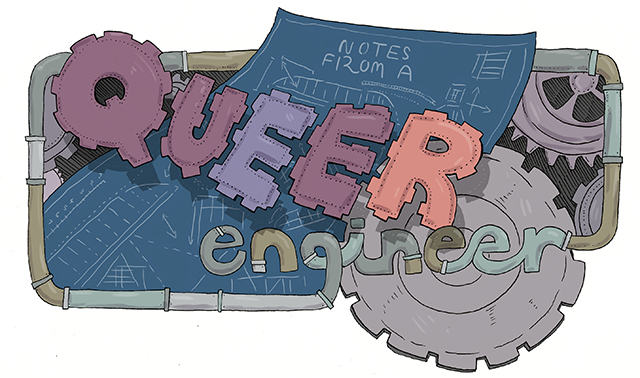Header by Rory Midhani
Feature image via Taylor Hatmaker
Happy Wednesday, ladybirds! Early voting started last week in Massachusetts and I wasn’t able to participate because I was traveling all week to visit a factory. But I went immediately after work on Monday and voted in my undead Han Solo costume, and it is the best thing I’ve done in a while. If you have the option, I highly recommend it! I feel awesome! If not, don’t worry, this godforsaken election will be over by the next time this column comes out. Here are some links to make you feel better in the meantime.
Can’t Hold Us Down
+ Eliminating grant deadlines is a feminist issue
+ “If You See/Hear Something, Say Something” – Dr Buddhini Samarasinghe reflects on inclusivity in STEM and how communities call out bad practice
+ Quantitative Evaluation of Gender Bias in Astronomical Publications from Citation Counts
+ Gender, Equity and Inclusion: a Cosmic Perspective by Prof. Bryan Gaensler, a man who apparently really get it!
+ No, Female Entrepreneurs Should Not Have To Hide Their Gender To Get Funding
+ Some truly inspirational women in STEM spoke at the TedWomen conference this year, including Anela Arifi and Ilda Ismaili, who are researching chicken feathers and chicken fat as potential sources of alternative energy.
+ Also, though, a nursing mother was kicked out of the conference for bringing her baby :/
Geekery Grab Bag
+ Tara C Smith: the epidemiology and pathology of zombie infections and calls for research and funding to prevent a zombie apocalypse
+ Five GIS Projects That Are Changing The Way We Understand Racism
+ Don’t use garlic to treat vaginal yeast infections (because Clostridium botulinum)
+ GrrlScientist: How songbirds became poisonous
+ Susan Maury has some interesting information for you about singing to babies
+ Ladybirds are invading the UK and it’s like, pretty chill, pretty zen to watch:
Lady Scientists
+ Raising Horizons: Discovering Dragons – Mary Anning and Dr Lorna Steele, pioneering women in science
+ Interview with Jill Tarter, co-founder of the SETI Institute whose real-life exploits were the inspiration for Contact:
Last year, as president of the California Academy of Sciences, I held a summit of women in science. It was an opportunity to be in the company of women, rather than one of a token number of women in a big crowd of men, and I was overwhelmed by the caliber of these women from across the spectrum in science, technology, engineering and math. In general, they aren’t just bubbling to the top. They’ve actually been there long enough to fight into the ranks of whatever you call echelon positions.
+ Lessons learnt from outstanding mid-career women in endocrine cancer research
Do Make Say Think
Notes From A Queer Engineer is a recurring column with an expected periodicity of 14 days. The subject matter may not be explicitly queer, but the industrial engineer writing it sure is. This is a peek at the notes she’s been doodling in the margins.









Comments
Some great articles here. Thanks for compiling this list!
So glad you enjoyed it!
Hark, a vagrant has a perfect Mary Anning comic. Also have you read A Natural History of Dragons? It’s a novel, but it has some parallels to Mary Anning’s story, if she had been richer and dinosaurs had still been alive but endangered. Would recommend.
Omg. Thank you for this gift.
That book sounds very interesting!
You’re welcome. There’s also one about Rosalind Franklin, but that one stings a little more.
In relation to the ladybirds, if you’re in the Uk and encounter them a friend of mine works on them and has this really cool ladybird challenge. https://ladybirdchallenge.co.uk/
She is an awesome science lady and a great friend plus it is fun so if you have a change take it!
Cool!
You know I would love to see a comedy about a female engineer making it in an engineering firm. She could be straight or gay but whatever she is, seeing her overcoming the insanity of her situation would be funny. Plus who doesn’t want to see a few male engineers be put in their place.
“who doesn’t want to see a few male engineers be put in their place.”
THE DREAM.
This is one of my favorite columns, by the way. I feel like it doesn’t get enough comments so I thought I’d leave one saying that.
That is so nice! Thank you! :D
As a queer woman in STEM I really appreciate this column! Thanks for this Laura!
You’re welcome! <3
British people, why do you insist on calling them ladybirds when they are not birds, they are clearly bugs. BUGS. LADYBUGS.
(I’m half British, I’m allowed to bitch)
We use the word bug to refer to illness not insects. I have a caught a ladybug is a euphemism for having caught an STI*.
*Not true but if you say anything with straight face and a British accent people will believe you.
I think we just call them birds because they fly. But the “lady” part refers to the Virgin Mary, known as Our Lady. Because she used to frequently be depicted wearing a red cloak. And the European ladybird has seven spots, corresponding to the seven joys and seven sorrows of Mary. I’m not sure what those joys/sorrows are but they were clearly familiar in Roman Catholic Medieval England.